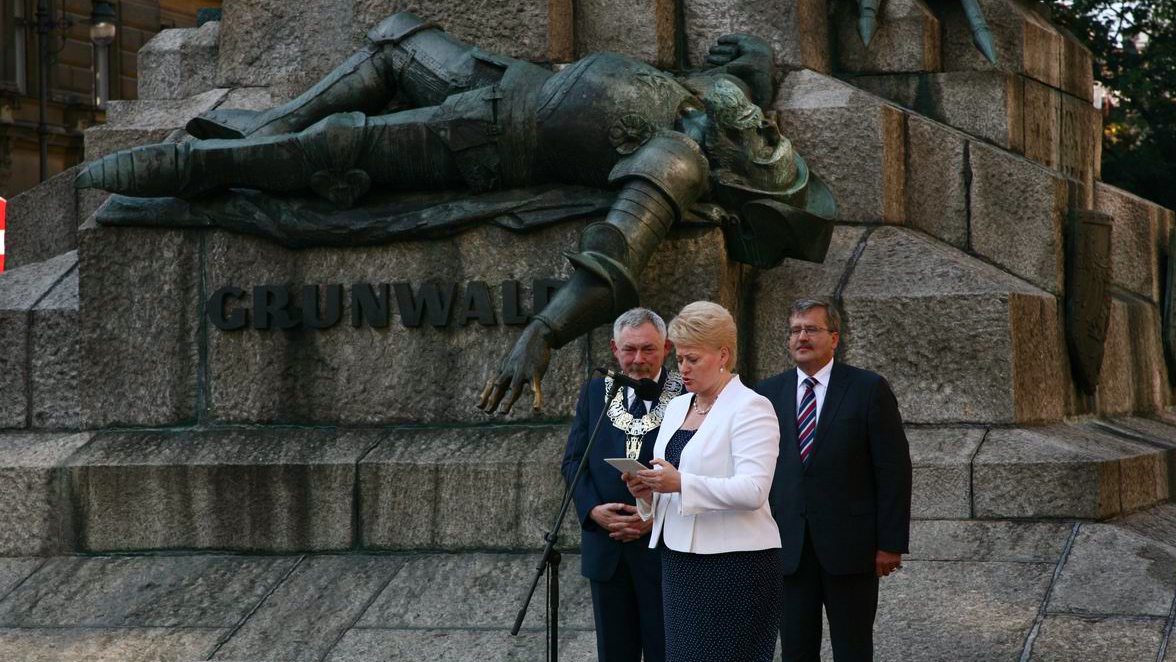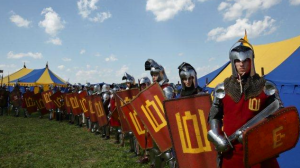
Grybauskaitė gives a speech in front of the Kraków monument for the battle. Photo by the Office of the President of the Republic Poland.
KRAKÓW, Poland — Thursday marked the 600th anniversary of the battle of Grunwald, as the Polish and Belarusians call it, also known as Žalgiris by the Lithuanians and Tannenberg by the Germans.
Whatever name you call it, the battle ranks in its importance in shaping the eastern half of the European continent with Stalingrad, Kursk, Kulikovo, the siege of Constantinople and Kosovo. Effectively putting a halt to the Teutonic expansion across northeast Europe, it allowed the ascendancy of the Polish-Lithuanian union that became the largest political unit in Europe from 1410 on until its dissolution in the late 1700s.
It became the stuff of romantic legends when nationalism swept Europe in the nineteenth and twentieth century. The Germans renamed a 1914 victory over tsarist Russia after the battle for propaganda reasons, as revenge for the medieval loss by the Teutonic Knights. One of Lithuania’s top basketball squads is named after it. Monuments to the battle and its participants can be found as far away as Central Park in New York City.

Actors pose in the uniforms of Grand Duchy of Lithuania soldiers for the Grunwald reeanactment on Thursday. Photo by Džoja Gunda Barysaitė/Office of the President of the Republic of Lithuania
It’s little surprise that on Thursday Poland was full of pomp for the anniversary with the Polish and Lithuanian heads of state visiting Kraków before heading north to witness a hot, sunny 6,000-strong reenactment of the battle.
Lithuanian President Dalia Grybauskaitė gave a speech in front of the Kraków monument for the battle, saying that the 15th century victory should inspire the two countries to work together more.
“When our two great nations fought in the Battle of Žalgiris, united as never before, their unity brought closer together the neighboring peoples. It encouraged them to participate in the victory that shaped the further pathway of not only our countries, but also of the whole of Europe,” Grybauskaitė said. “We now have excellent conditions for our people to work, aspire and win together. There is only one eternal and universal prerequisite — and that is unity. Only united will we stand and prevail.”
Indeed, Grybauskaitė’s one-year tenure has seen a blossoming of cooperation between the two countries, as the late President Lech Kaczyński and her agreed to set up electricity and gas links. Although the two have been steady allies since the fall of communism, lingering memories of the war over Vilnius, the repression of ethnic minorities on both sides of the border in the interwar years and Lithuania’s spelling law have belied cooperation.
The Polish president-elect Bronisław Komorowski expressed similar sentiments as Grybauskaitė.
“Meeting with the president of Lithuania, we thought of the full glory and size of the past, the difficult periods in the relations between our two peoples, but also thinking and hatching plans for today, Polish-Lithuanian relations and the future of the Lithuania and Poland in the EU and NATO,” Komorowski said.
This article is free to view. To read Baltic Reports’ subscription-only articles, click here.












